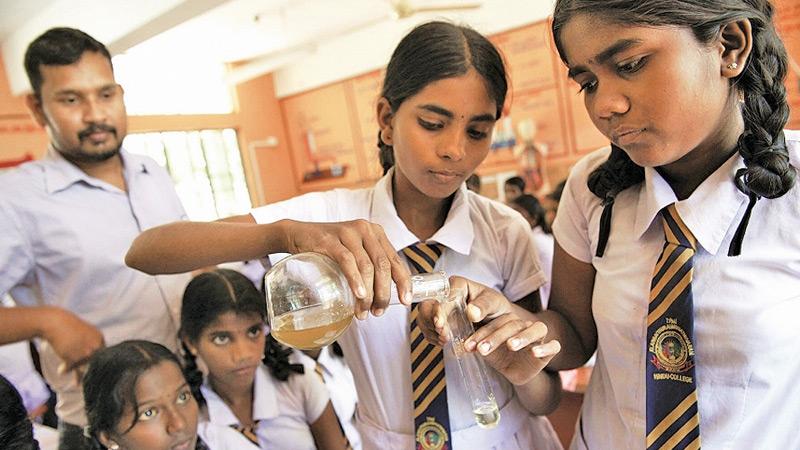
Today, schools and higher education institutes in Sri Lanka are positioned in a type of pressure-cooker environment. In this atmosphere, students need to be taught to handle setbacks and adopt a positive frame of mind.
Five or more decades ago, anguish among students was something unheard of. If at all, some sort of anxiety would have occurred a few days before the year-end examination. That too would be resolved with the results.
Society has witnessed radical changes and today it’s a different world. Students have easy access to ‘inappropriate content’ on the internet. Police-and-robber games of yesteryear are replaced by terrorist threats and suicide bombers. They are exposed to unrelenting visuals of violence on television. In this scenario, the average Sri Lankan child witnesses greater forms of stress and strain than previous generations. Despite government regulations, ragging crosses unacceptable limits in some university hostels. Moreover, changing family dynamics, with double-income households, strenuous commuting and mobile phones that blur work-life boundaries take their toll on familial well-being.
No easy answers
In these tumultuous times, a barrage of uncertainty clouds our minds. Can we, as parents and educators, remain passive and hope for the better? Of course, we cannot shield our children from the troughs of life forever. But does that mean we should remain neutral?
Many parents give their teenagers mobile phones, not to empower them, but to keep track of their whereabouts. However, remote monitoring is not a stress-proof buffer. Overprotecting our wards may actually harm them in the long run as we may deprive them of opportunities for developing essential life skills.
Thus, when children are more vulnerable to the vicissitudes of our times, how can we equip them to handle these pressures on an even keel?
The science of positive psychology informs us of tried-and-tested programs to maximise human potential, in all its myriad forms. Until the 1990s, psychology focused on causes, diagnosis and treatment of various forms of mental illness. As researchers studied problems like depression, inattention and obsessions, psychology as a field was perceived as dealing with mental ill-health.
This notion was turned on its head in 1998 when Martin Seligman proposed that psychology should also focus on mental health and well-being. What factors boost happiness and longevity? How does one find meaning in life? As psychologists began to grapple with these issues, a vast body of knowledge has grown that can be of immense benefit to parents and teachers.
Teaching resilience
When a child faces a setback, he may either succumb to its pressures or rise above it, depending on how he perceives and interprets the problem to himself. For example, when Nirupa fails her math exam, she exclaims, “I am such a loser. If I didn’t pass my year-end exam, how will I cope at the A/Ls? I may not get selected to campus and everyone would think I am dumb.”
Rajiv, on the other hand, consoles himself saying, “The exam was tough. Even the highest mark was lower than usual. Now, I know this teacher gives hard exams and I have to prepare even harder for the finals.”
Nirupa perceives the problem through a pessimistic lens: she takes her failure personally, feels that the exam will impact her entire academic performance. In contrast, Rajiv feels his failure was due to external circumstances and he can make a proactive effort to study harder. Thus, by systematically teaching children ways to challenge their pessimistic thoughts, we can help them function more optimally.
Social-emotional intelligence
A path-breaking program developed at Penn State University, USA, attempts to promote children’s social-emotional intelligence.
Through stories, role-plays and cartoons, the program fosters self-awareness of emotions in children. Many children, especially those with attention problems, are usually unable to curb their ‘gut reactions.’ By learning to identify and label feelings and use self-calming techniques, a child can conquer the ‘impulse of the moment’ and react in a more measured manner.
Japanese approach
Sri Lankan education system typically emphasises cognitive tasks over other aspects of a child’s personality. It means, our education encourages a student to read, listen or write and process mentally new information and allow them to recall, retrieve from memory and use that information at a later time. Today, in developed countries there is a refreshingly different outlook on the education system. In stark contrast to our education system, they focus on children’s social and emotional development.
In Japan, e.g. a typical six to eight-year-old spends only five per cent of the school day in direct academic instruction. Children are given a lot of time for free, unstructured play so that they may forge bonds and learn how to cooperate with one another. An integral component of Japanese schooling is asking children to engage in ‘hansei reflection’ i.e. learning from reflecting on experience and not learning just from experience.
In Japan, when someone makes a mistake, they would apologize profusely, take responsibility, and propose a solution on how they could prevent the same mistake from happening in the future. Hansei is a core concept of Japanese culture. It’s not about shame or guilt. Rather, it’s about admitting there is room for improvement – and committing to that improvement.
Misbehaviour is typically met with questions and discussions to promote understanding rather than punishing and evoking blind compliance. Teachers ask children to focus on feelings of others when viewing consequences of their actions. The three pivots of Japanese elementary education are fun, participation of all members and a focus on a group’s growth as opposed to individual achievements.
Reforms
It’s time our education system is reformed by adopting a more holistic approach with continuous assessment. Many teachers and parents would be initially apprehensive about such transition.
To offset their fear, educators should draw upon findings from concrete, evidence-based positive psychology programs to promote children’s social and emotional intelligence. The shift in emphasis from purely cognitive tasks may thus usher a truly positive change in our children.
